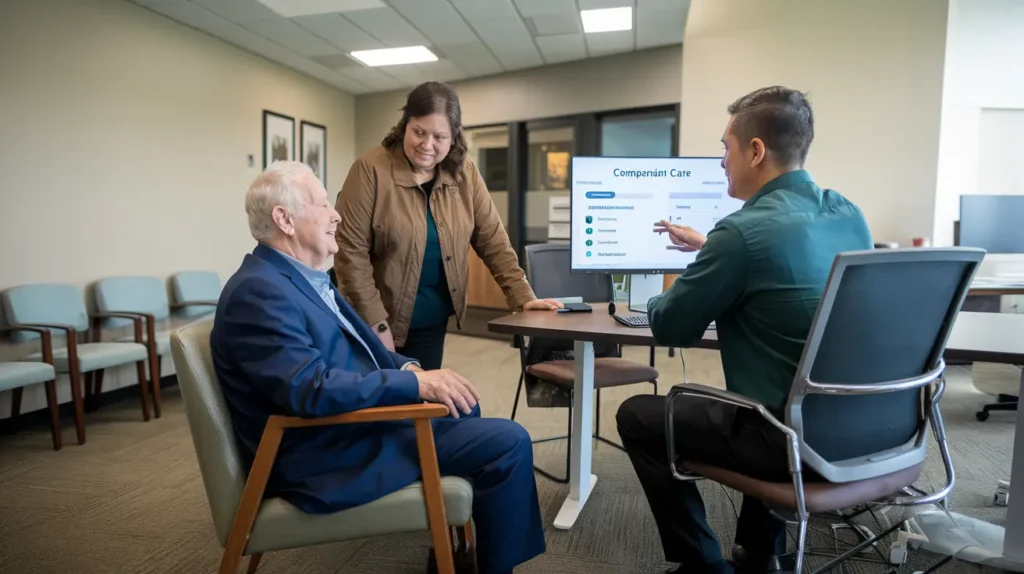Senior Companion Care Costs in Indianapolis
After spending 15 years coordinating senior care services in Indianapolis, I’ve seen firsthand how families struggle with understanding companion care costs. Here’s what startled me recently – nearly 40% of Indianapolis seniors now live alone, making companion care more crucial than ever. But here’s the thing – figuring out the actual costs shouldn’t be another stress in your life. Let me break down everything I’ve learned about companion care pricing in our city.
Understanding Basic Companion Care Services in Indianapolis
I remember when my own aunt needed companion care, and boy, was I confused about what exactly we were paying for! Companion care is basically like having a friendly, trained helper who provides non-medical assistance. Think of it as having a trusted neighbor who’s actually trained for the job.

In Indianapolis, standard companion care typically includes things like socializing, medication reminders (though they can’t actually give the meds), light housekeeping, and running errands. I’ve found that many families don’t realize companionship can include activities like playing cards, reading together, or even just watching Colts games together – it’s not just about sitting there!
The tricky part is that additional services can really affect what you’ll pay. For instance, I had a client who needed transportation to weekly doctor’s appointments on the north side. That extra service bumped up the cost, but it was worth every penny for the family’s peace of mind.
Local regulations in Indianapolis also play a big role in pricing. Our city requires specific training and background checks for caregivers, even if they’re just providing companion services. I’ve seen some families try to skip these requirements by hiring under the table, but trust me – that’s asking for trouble!
Average Companion Care Costs in Indianapolis
Let me shoot straight with you about current costs in Indy. Right now, you’re looking at anywhere from $20 to $30 per hour for basic companion care through an agency. I remember when it was closer to $15 just a few years ago – times sure have changed!
Here’s a breakdown based on my experience coordinating care:
- Part-time care (4 hours/day): $80-120 daily
- Full-time care (8 hours/day): $160-240 daily
- Weekend rates typically add $2-5 per hour
- Holiday rates can jump to $35-45 per hour
Now, if you’re thinking about hiring an independent caregiver, they might charge $15-22 per hour. Sounds cheaper, right? Well, hold that thought – I’ve seen too many families learn the hard way about liability issues and backup care needs.
Factors That Influence Companion Care Pricing
You wouldn’t believe how many factors can affect the final price! I once worked with a family who lived in Geist, and their rates were about 15% higher than similar services in Lawrence. Location within Indianapolis really matters.
The level of assistance needed is huge too. Basic companionship costs less than if you need someone who can help with mobility or who has special training in memory care support. I’ve seen pricing vary by up to $8 per hour based on these factors alone.
Schedule flexibility is another biggie. Want someone to come at specific times each day? That’s standard pricing. Need someone who can change schedules weekly or come on short notice? That’ll cost you extra – sometimes up to 25% more.
Caregiver experience makes a difference too. I remember placing a caregiver with 15 years of experience – she charged more, but she knew exactly how to handle every situation that came up. Sometimes paying more upfront saves money (and headaches) in the long run.
Payment Options and Financial Assistance
This is where things get interesting – and where I’ve helped many families find money they didn’t know was available! First off, long-term care insurance can be a goldmine if your policy covers companion care. I once helped a family discover their mom’s policy covered $150 per day of care they’d been paying out of pocket!

Veterans and their spouses might be eligible for VA Aid & Attendance benefits. Don’t let anyone tell you Medicare covers companion care – it doesn’t. But Indiana’s Medicaid CHOICE waiver program might help if you qualify.
Some local programs in Indianapolis can help too. The CICOA Aging & In-Home Solutions sometimes has grants available. I’ve also seen families use combination approaches – like using agency care part-time and family care other times.
How to Save Money on Companion Care
Here’s where my experience really comes in handy! I’ve helped hundreds of families reduce their care costs without compromising quality. One of my favorite tips is adjusting the schedule strategically. Instead of booking 4-hour minimum shifts, some agencies will do 2-hour visits if you schedule them regularly.

Group companion care is another option that’s gaining traction in Indy. I’ve connected families in the same retirement communities who share a companion – cutting their costs almost in half! Just make sure everyone’s clear on the schedule and expectations.
Consider combining family care with professional care. One family I worked with had relatives cover mornings and evenings, using paid care only during the middle of the day. They saved almost $2,000 monthly this way!
Conclusion
After years in this field, I can tell you that while companion care costs in Indianapolis might seem overwhelming at first, there are always options to make it work for your budget. The key is understanding what you’re paying for and exploring all available resources.

Remember, the cheapest option isn’t always the best – but the most expensive isn’t necessarily the best either. Focus on finding care that matches your needs and then explore creative ways to make it affordable.
Take action today by getting assessments from several agencies – prices and services can vary significantly. And don’t forget to check out CICOA’s resource center for additional support. Your perfect care solution is out there, and it might be more affordable than you think!
Want to share your own experiences with companion care costs in Indianapolis? Your insights could help other families in similar situations. And if you need more specific guidance, reach out to local senior care coordinators who can help you navigate these waters.







